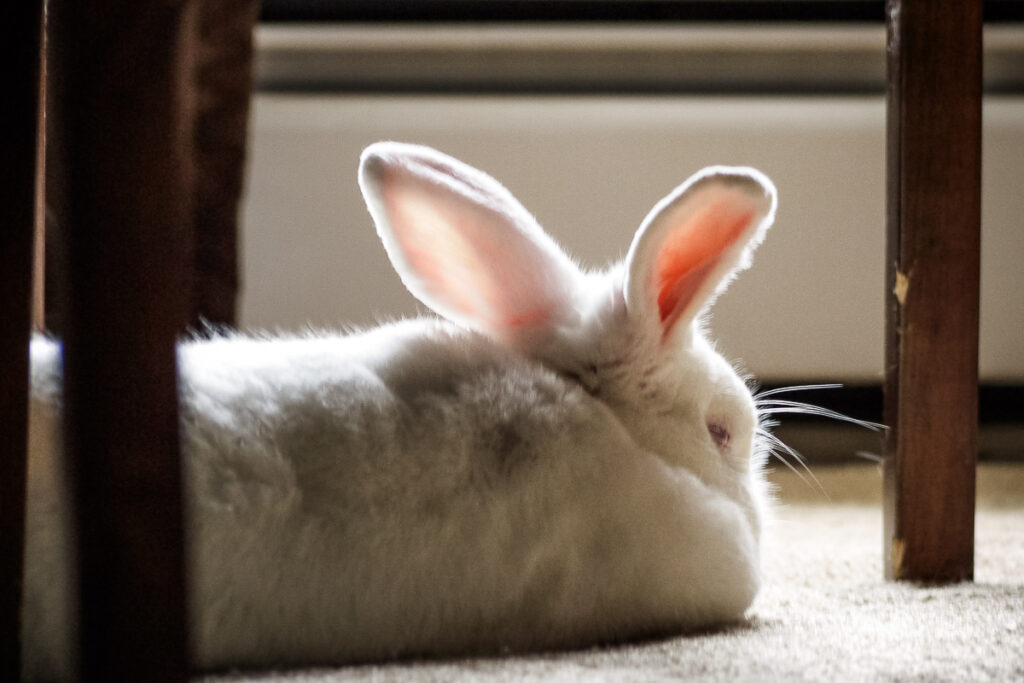Supporting your rabbit through the loss of another pet.
Many of us who have rabbit companions have more than one. We have other rabbits or other house pets. Whenever we lose one of these dearly loved family members, we often lose our rationality. We tend to be so preoccupied with our own suffering that we overlook the fact that our animal family members may be suffering, too. Because animals don’t behave like humans, we may misinterpret their signs of grief. We expect periods of moping and periods of being withdrawn, but there are other behaviors that can also indicate psychological stress. Excessive water drinking, fur chewing and carpet digging are among them.
When our 4-year-old house rabbit Lefty lost his companion, Dinah, there were no changes in his personality. Lefty is one of our most playful and high-spirited rabbits. We did notice, however, that he drank three times the amount of water that was normal for him, and he jumped onto our bed and chewed holes in our pillowcases.
Animals do not necessarily cope with grief in the same way that we do, but their grief is nonetheless stressful. If your surviving rabbit misbehaves during the weeks following a death in the family, you may tend to scold and reprimand without realizing that he is experiencing difficulty of his own. This is the time to start looking for a new friend for your friend, but first pave the way for a smooth transition into a second or third relationship.
The Price of Bliss
Seldom does a pair of rabbits die together. One of the rabbits will be left behind, lonely and missing the other (a price we all pay for our relationship with shorter-lived beings than ourselves). We each cope with grief in our own way, but there are a few things you can do to help your rabbit cope with his.
It may sound bizarre, even morbid, but leaving the deceased body with the bereaved companion for a while (perhaps a few hours) will shorten the grief period. Animals accept death, better than we do, as a natural occurrence. What is unnatural for them is to have their companions taken away to die elsewhere. You can’t explain to them what has happened.
A rabbit whose mate is removed prior to death will wait patiently for his partner’s return and may be unable to accept a new relationship until he is convinced that his mate will not be coming home. We have seen this take a month or more. A new companion, introduced at this time, may be met with belligerence.
When your pet is terminally ill, your veterinarian considers psychological as well as physical needs, and home care is usually prescribed. There isn’t always a choice, however, and you may be faced with a lonely survivor who doesn’t understand why his mate is gone. This situation will require more effort from you–attention, treats, and special petting/grooming sessions, and he will require more time to adjust.
It was by accident that we discovered how much the grieving process is shortened by observation of the physical reality. A young male lop, whose mate had died during the night, had been beside her body for several hours before we found them. It was only a week later that he was able to accept a new friend. Isn’t this what we want for our animals friendship whenever it can happen? We don’t want a long mourning period. They don’t have that much time themselves.
In our fostering efforts, we rescue many homeless rabbits in the twilight of their years. We give them companions for whatever time they have left. Sometimes it’s short. But whenever possible, we allow the surviving companion a “vigil,” so that new relationships can sooner begin.
Questions We May Ask
What about the autopsy? Shouldn’t it be done immediately? What about contagious diseases? Shouldn’t sick rabbits be separated from healthy ones? Theoretically, yes to all of these questions. But at certain times there are other considerations.
Our veterinarians are experienced enough with autopsies to distinguish changes that take place after death from the abnormalities that occurred prior to death. This means that we have a few hours to make adjustments. Separating sick rabbits from their partners is sometimes necessary, but we avoid it if we can. Each case should be considered individually and discussed with your vet.
- How contagious is the disease?
- Hasn’t the cagemate already been exposed?
- Will it be more stressful to separate a closely bonded pair?
- Does the cagemate offer support to the sick rabbit and improve chances of recovery?
We have often risked our healthy rabbits by letting them stay with their sick companions to the end, and we’ve not lost one of these supporters. A phenomenon that I’ve often observed is a temporary outburst of energy experienced when they leap and dance. At first, I was a little horrified, interpreting what I was seeing in human terms.
We have social mores that dictate how we behave at the death of a loved one and how we show proper respect. The bunnies don’t observe our rules. They appear to express joy rather than sorrow, even though they obviously care for their companions and will undoubtedly miss them. I try to explain this behavior as some kind of sudden “vibration” in the air, reviving the rabbit at the death of his companion. Or, I think to myself, maybe the bunnies know something that we don’t know.
NOTE: If your rabbit died at the veterinarian’s, or was autopsied, you may have no choice in the matter. In that case, just shower your rabbit with extra attention and pay attention to their behavior during the mourning period. If your rabbit died at the vet’s, but was not autopsied, however, you can certainly ask to bring your rabbit home to show to his or her companion.
©Copyright Marinell Harriman. All Rights Reserved. Republished with the permission of the author.
Pet Loss Support For Your Rabbit was originally published in House Rabbit Journal v2n1

